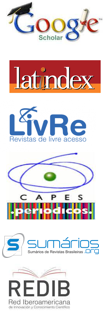Efeitos de um Programa Educativo com Universitários da Área da Saúde de um Centro Universitário
DOI:
https://doi.org/10.17921/2447-8733.2024v25n2p277-285Resumo
A exposição aos conteúdos informacionais sem embasamento científico, por meio de revistas e recursos digitais eletrônicos, são armadilhas para a formação segura do aprendizado. O objetivo do estudo foi verificar os efeitos de uma intervenção no consumo alimentar, no conhecimento em nutrição e nos fatores que facilitam e dificultam a adoção de uma alimentação saudável pela família entre universitários. Trata-se de um estudo de intervenção, com 114 universitários de idade ≥18 anos. Foram levantadas informações sociodemográficas, de consumo alimentar, conhecimento em nutrição e de fatores que dificultam e facilitam a adoção de uma alimentação saudável pela família, além do peso e altura autorreferidos. A intervenção foi baseada no Guia Alimentar para a População Brasileira, durante duas semanas. Após a intervenção, foi enviado outro questionário para avaliação do peso, consumo alimentar e conhecimento em nutrição. Verificou-se na questão 1 que avalia a quantidade média de frutas ingeridas ao dia, que o consumo adequado aumentou após a intervenção (p = 0,001). A questão 6 que avalia a retirada de gordura aparente das carnes, observou-se o aumento na proporção desse comportamento adequado após a intervenção (p = 0,001). Nas outras questões avaliadas não houve diferença estatística. Conclui-se que o programa educativo melhorou o consumo alimentar diário. Os universitários que apresentaram maior conhecimento em nutrição tiveram maior pontuação na avaliação do consumo alimentar e outros hábitos de vida.
Palavras-chave: Estudante. Alimentação Saudável. Promoção da Saúde. Educação Alimentar e Nutricional.
Abstract
Exposure to informational content without a scientific basis through digital resources, are traps for the safe learning formation . The objective of the study was to verify the effects of intervention on food consumption, knowledge of nutrition and factors that facilitate and hinder the adoption of healthy eating by the family among university students. This is an intervention study, with 114 university students, aged ≥18 years. Information was collected such as: sociodemographics, food consumption, knowledge in nutrition and factors that hinder and facilitate the adoption of healthy eating by the family, in addition to self-reported weight and height. The intervention was based on the Food Guide for the Brazilian Population, for 2 weeks. After the intervention, another questionnaire was sent to assess weight, food consumption and nutrition knowledge. It was verified in question 1 that it evaluates the average amount of fruits ingested per day, that the adequate consumption increased after the intervention (p = 0.001). Question 6, which evaluates the removal of apparent fat from meat, showed an increase in the proportion of this appropriate behavior after intervention (p = 0.001). In the other questions evaluated, there was no statistical difference. It was concluded that educational program improved the daily consumption of fruits and the frequency of removal of apparent fat from meat. The university students who had more knowledge in nutrition had higher scores in the evaluation of food consumption and other lifestyle habits and pointed out more facilities to adopt a healthy diet for the family.
Keywords: Students. Healthy Eating. Health Promotion. Food and Nutrition Education.
Downloads
Publicado
Como Citar
Edição
Seção
Licença
Copyright (c) 2024 Revista de Ensino, Educação e Ciências Humanas

Este trabalho está licenciado sob uma licença Creative Commons Attribution-NonCommercial-NoDerivatives 4.0 International License.


